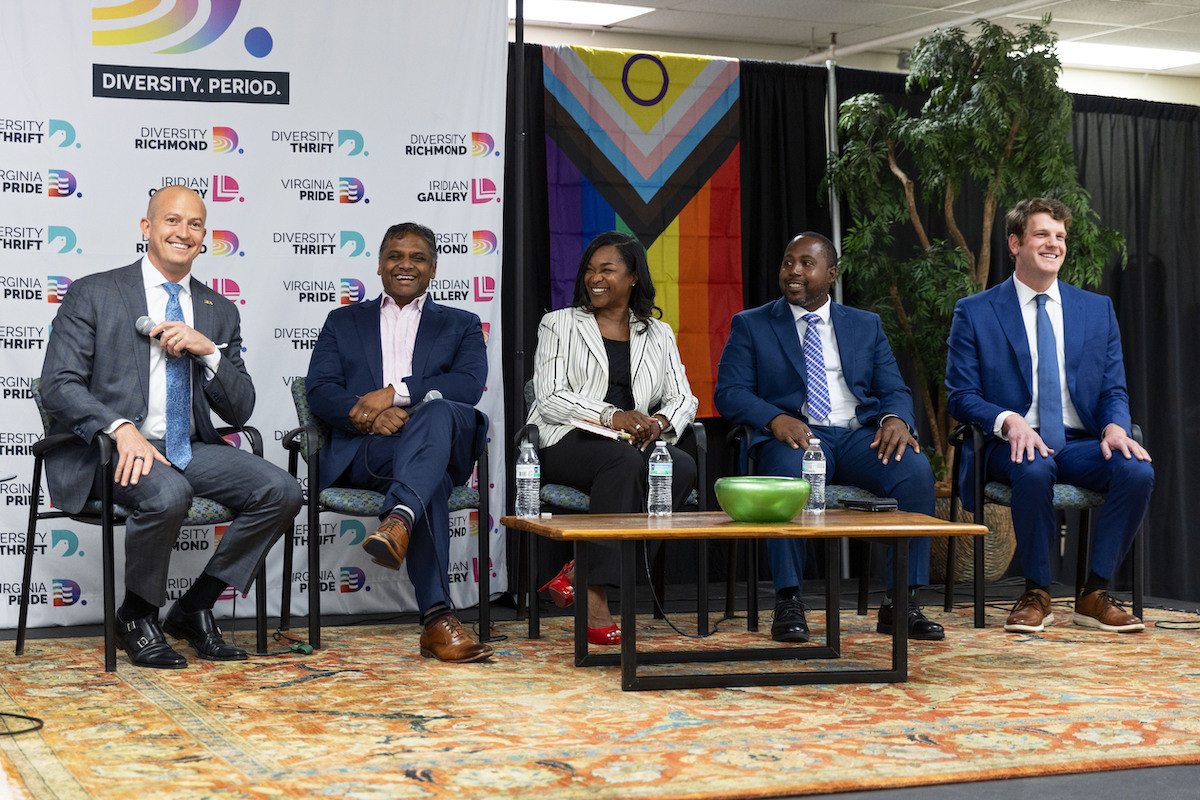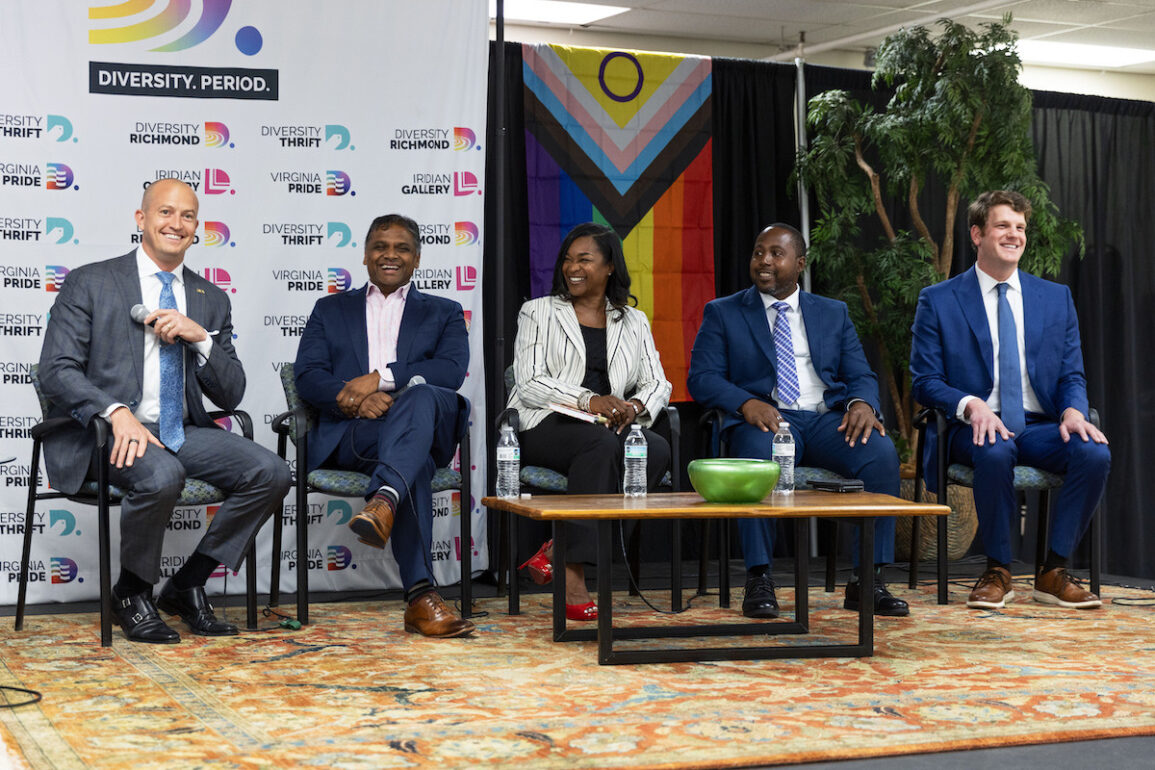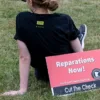
From Los Angeles’s recent reparations report to Chicago’s reparations task force, local and state governments across the U.S. are moving closer to enacting Black reparations, historically associated with financial compensation for descendants of enslaved Africans.
In Richmond, Virginia, the conversation around reparations is intertwined with efforts to acknowledge and repair the harm caused by what was once the second-largest slave market in the nation. Earlier this year, the city introduced The Shockoe Area Project to recognize that dark history and memorialize the lives of those enslaved.
With the mayoral race underway in Richmond, Next City and VPM News asked candidates to outline their visions for reparations in the former capital of the Confederacy. We’ve shared all five candidates’ responses in full below.
City Councilor Andreas Addison has promised “transformational investments rooted in racial, economic, and environmental justice.” Prominent pediatrician Dr. Danny Avula is running on a public health-based platform. Michelle Mosby, a former Richmond City Council member and founder of a nonprofit focused on re-entry, is focused on affordable housing, public safety and workforce development. Maurice Neblett, an entrepreneur making his first run for office, is campaigning on financial accountability, public safety and education. Harrison Roday, founder of a local community development fund, has vowed to “champion a truly equitable future” for all residents.
We asked all five the following questions: What does “reparations” mean to you? What is your vision for reparations in Richmond? Would you consider something similar to Chicago’s Black Reparations Task Force, launched through the mayor’s executive order, and if so, what would that look like? (The candidates’ answers have been listed in order of response time, and the entries have been lightly edited for spacing.)
Michelle Mosby
Mosby’s team confirmed that she would answer all three questions with the following statement.
While discussions about reparations are important and necessary for acknowledging our history, my focus is on creating tangible, actionable solutions that uplift and empower our communities today. We need to reinvest in the neighborhoods and communities that have been left behind for too long. This means enhancing and expanding programs like the Office of Community Wealth Building, which plays a critical role in breaking cycles of poverty and creating pathways to economic mobility.
Furthermore, we must look at innovative solutions such as Guaranteed Income programs, which have shown promise in cities across the country as a way to provide immediate financial stability to families. By investing directly in our residents, we can help them build wealth, access better opportunities, and ensure that everyone in Richmond has a fair shot at success.
Our commitment is to create a Richmond where every resident, regardless of their background or zip code, has the opportunity to thrive. This is about justice and fairness, yes, but also about building a stronger, more prosperous city for all of us.
Danny Avula
What does “reparations” mean to you?
At its most basic, reparations means repair. I believe when something is stolen or an injustice causes harm, we have a moral imperative to return, repair, and restore what was lost. Reparations is a term with a wide variety of interpretations and while I care very deeply about matters of racial equity and healing, I do not want to pose as an expert specifically on reparations. I have a long track record of addressing racial inequity through my work in public health and my commitments to cross-racial healing in community. But in leading any “reparations” effort in Richmond, I commit to listening and empowering those who have been working on reparations specifically much longer than I.
I figured for the purposes of these questions and my potential role as mayor, it would be helpful to know how my thinking on this has been influenced as I answer these questions. Carrying out reparations inherently depends on what we mean by the term and defining the unique roles and responsibilities depending on context (i.e. federal government, individuals, local government, institutions, etc.). My views on racial reconciliation have been influenced primarily by [Christian leader and civil rights activist] John Perkins, my views on Richmond’s history and approach to racial healing have been heavily influenced by Ben Campbell’s book “Richmond’s Unhealed History,” and I affirm the case for reparations made by Ta-Nahesi Coates in the Atlantic and Greg Thompson and Duke Kwon in their book “Reparations.”
For the purposes of my responses, I am going to address specifically the need for repair for African Americans while acknowledging that reparations are owed in many contexts, certainly to the native people whose land was stolen from them by colonizers.
What is your vision for reparations in Richmond?
For 350 years Richmond maintained a system of government and economics based on systemic racism. In the last 70 years much has finally changed, but major elements of systemic racism remain. I long for the full healing of Richmond and my vision for reparations would be when the city that was once the Capital of the Confederacy will be known as the Capital of Racial Healing. Simply stated — the establishment of full equity for all citizens.
Mayor Brandon Johnson of Chicago recently signed a historic executive order to launch a Black Reparations Task Force. Would you consider something similar for Black residents of Richmond and if so, what would that look like?
Concretely, I propose establishing a Commission on Truth and Reparations. The Commission will include leaders and community representatives from throughout Central Virginia. I would ask them to approach the work by identifying where racist barriers remain in our community and to identify strategies to remove them. I would then seek to support, champion and operationalize those strategies. This Commission is a pledge to shape the future of our city by confronting the legacy of inequity that has plagued Richmond and Virginia for far too long. (This language is borrowed from Chicago Mayor Brandon Johnson, June 17, 2024, as he announced an executive order appointing his Black Reparations Task Force and Agenda.)
The task is not simple, and it is not quick. First, we will accurately identify the reality. Second, we will identify the agenda of Hope and Reparation. Third, with all our partners in the public and private sectors, we will set out to move us along the path of recovery and repair towards the vision of full equity for all citizens, measured by no racial disparity between outcomes of life, liberty and the pursuit of happiness.
Maurice Neblett
What does “reparations” mean to you?
As someone who’s grown up in Richmond, I’ve seen how deeply inequality has affected our communities, particularly on the Southside where I’m from. For me, reparations are about making real, tangible changes that address the long-standing injustices faced by Black communities in Richmond. It’s about more than just financial compensation; it’s about ensuring that everyone in our city has access to the opportunities they need to thrive. Reparations, in this sense, are about building a Richmond where equity is at the core of everything we do, starting now.
What is your vision for reparations in Richmond?
My vision for reparations in Richmond is rooted in practical, community-driven solutions that make a real difference today. As someone who knows this city well, I believe in investing in the things that matter most: education, housing and job opportunities. I want to see programs that help people become homeowners, find good jobs and ensure our schools are preparing every child for success. Reparations should be about closing the gaps that have held our communities back for too long. It’s about creating a Richmond where everyone, no matter their background, has the chance to succeed. This isn’t just about the past; it’s about building a better future for all of us.
Mayor Brandon Johnson of Chicago recently signed a historic executive order to launch a Black Reparations Task Force. Would you consider something similar for Black residents of Richmond and if so, what would that look like?
Absolutely. As a lifelong Richmonder, I know how important it is to address the challenges that our Black communities continue to face. I would strongly consider establishing a Black Reparations Task Force in Richmond, modeled after successful initiatives like the one in Chicago. This task force would be essential in identifying the most effective ways to address the specific needs of our community, whether that’s through financial support, investment in Black owned businesses, or ensuring everyone has access to quality housing and education. The goal is to create actionable plans that make a real difference in people’s lives. The future of Richmond is now, and we need to act quickly to make sure it’s a future where everyone can succeed.
Harrison Roday
What does “reparations” mean to you?
I believe our government (and community) needs to ensure everyone, no matter who they are, has access to opportunity. We are clearly very far from that goal today, and solving this problem requires intentional investment. The history is clear. Massive disparities exist in areas such as access to high quality public education, affordable housing, and economic opportunities—just to name a few.
To me, reparations means not just recognizing these inequalities as well as the role that harmful actions and systems rooted in discrimination and racism, including slavery, redlining and disinvestment, have played in creating and driving them — but working purposefully to address them head on. I strongly believe that active policy measures and investments need to be taken to fix systemic inequities. This requires that we understand what ordinances, policies, and practices have caused lasting harms and identify what actions and investments must be pursued to begin to repair them.
What is your vision for reparations in Richmond?
In Richmond, we need to focus on investing not just in affordable housing and our public schools, but also prioritizing economic development that supports the East End and Southside. We must fight for community benefit agreements for key projects that support contracting with Black-owned businesses. And the City must reinvigorate its efforts in minority contracting and business development.
Mayor Brandon Johnson of Chicago recently signed a historic executive order to launch Black Reparations Task Force. Would you consider something similar for Black residents of Richmond and if so, what would that look like?
I would wholeheartedly welcome the creation of a task force that provides additional recommendations on how to address historical disparities. It would be a necessity for this task force to have strong community involvement and representation, and also have a transparent and inclusive process — one where those who are directly affected have a voice and are engaged in the conversation. There will need to be public forums and roundtables. It will require diving deep into historical decisions, policies, and practices as well as those still in place today so that we, as a City, can fundamentally understand how to address these harmful inequities. To do so, the task force would need to engage with a range of experts from our community, including historians, policy and legal experts, and advocates.
And while the dialogue that this task force will provide will be important in its own right, it is vital the task force is not just discourse alone — it must be accompanied by a commitment to action. This task force would help inform how Richmond will move forward in addressing historical disparities and ensure that everyone, no matter who they are, has access to opportunity.
Andreas Addison
What does “reparations” mean to you?
In 1967, President Johnson established the National Advisory Commission on Violence and Civil Disorders, or Kerner Commission, to investigate the cause of more than 150 riots in Detroit, Newark, and other cities across the country. He expected to find evidence of a Black militant conspiracy but received a groundbreaking 426-page report on race relations in the United States. The commission visited predominantly-Black communities, noting the role of segregation, police brutality, limited economic opportunities, and poor living conditions as the reason for deepening racial divisions. The report concluded, “Our nation is moving toward two societies, one Black, one white –separate and unequal.”
More than a half-century later, many of the findings and recommendations of the report still hold true today. White institutions create, maintain, and condone systemic racism and discrimination in housing, education, and employment.
Reparations is the need to repair and be accountable for the legacy of enslavement. Today, it’s in the form of structural racism and discrimination impacting Black people in this country. These effects create disparities in health, education, housing, environment, policing, and economic security. Every decision we make as a city must be rooted in racial and economic justice. We must be intentional about dismantling systemic barriers and breaking through generational poverty to improve the quality of life and close the life expectancy gap that disproportionately impacts Black, Brown and lower-income residents. We do this through policies, programs and representational political power that will right these wrongs until there is justice and equality for Black people and those who historically have been disenfranchised.
What is your vision for reparations in Richmond?
My vision for the city is a new way forward in how we operate, innovate, grow and meet the needs of everyone who calls Richmond home. Yes, that includes intentional, equitable investments for underrepresented, underserved and marginalized residents. Here’s how we get there:
-
Fund and implement my Southside Economic Development Plan to generate economic growth and bring new grocery stores to South Richmond.
-
Build the future of work by creating a Southside Development Workforce Center with union-led training and apprenticeships so young people have a path to success.
-
Creating more diverse housing options at all price points to reduce displacements, evictions, and financial strain, especially for low-wage earners and seniors on fixed incomes.
-
Monumental investments in sidewalks, street lights, parks, athletic fields, and traffic calming measures for safe and walkable neighborhoods.
-
Deliver a high-quality education starting with our earliest learners so all students’ learning experiences and outcomes are strong regardless of socioeconomic status.
Mayor Brandon Johnson of Chicago recently signed a historic executive order to launch Black Reparations Task Force, would you consider something similar for Black residents of Richmond and if so, what would that look like?
I would be open to exploring a task force to examine reparations if there is an overwhelming movement to create that commission, similar to what we witnessed with the Civilian Review Board. If that task force were created, I would like to see its members provide recommendations on strengthening community engagement, existing master plans, Richmond’s Equity Agenda, and specific policies to uplift Black residents in the city.



